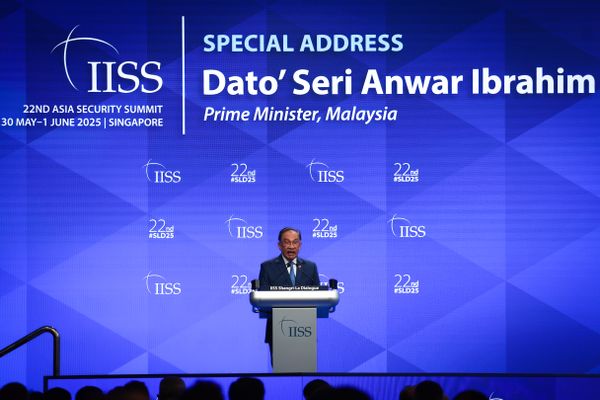SINGAPORE, May 31 — Prime Minister Datuk Seri Anwar Ibrahim has reiterated that Malaysia, as Chair for Asean 2025, is committed to defending Asean's centrality and promoting its active non-alignment.
Speaking at the 22nd Shangri-La Dialogue in Singapore today, Anwar cautioned against a new orthodoxy that not only affects how diplomacy is viewed but also how security will be structured, risking the fragmentation of the regional architecture and undermining Southeast Asia’s strategic autonomy.
“Preserving our autonomy is not about resisting others. It is about strengthening ourselves. This, in essence, is what Asean centrality is about.
“We do not object to like-minded partners talking amongst themselves. But coalitions that build walls instead of bridges, stoke arms competition, or undermine the legitimacy of multilateralism should give us pause.
“A stable region is not one braced for conflict, but one grounded in openness, transparency, and habit-forming cooperation,” he said.
He also stressed that Southeast Asia does not need a new Cold War, but rather an equilibrium that promotes cooperation without coercion and balance without bloc politics.
Anwar said that Asean, through decades of consensus-building, was built to foster stability in a region where peace is sustained, freedom is protected, and neutrality is respected.
“If this Johor-Singapore Special Economic Zone is a glimpse of what cooperation can achieve at the bilateral level, then Asean is the wider canvas.”
“Asean was never meant to dominate or dictate. That foundation still holds,” he said.
Referring to the recently concluded 46th Asean Summit and related summits in Kuala Lumpur, the prime minister described them as substantive and productive, where several historic agendas were made.
These include the adoption of the Kuala Lumpur Declaration on Asean 2045, a decision on Timor-Leste’s admission to the bloc and on the Myanmar situation.
The convening of the Asean-GCC Summit and Asean-GCC-China Summit, meanwhile, strengthens Asean's strategic aperture, he said.
Anwar reiterated Malaysia’s concern about rising tensions in the South China Sea amid its complex dispute and called for calm, direct and consistent engagement with all parties.
“We have no interest in seeing tensions spiral into confrontation, least of all in waters so critical to our own security and prosperity."
The prime minister said Malaysia does not subscribe to the concept of spheres of influence, stressing that history has shown how such divisions by major powers often render smaller nations voiceless.
He said that true stability does not come from dividing the world into zones of control, but from creating space for all countries to participate meaningfully in shaping the global order.
As such, he reaffirmed Malaysia’s commitment to pursue an active non-alignment approach in its foreign policy and to maximise its own strategic space.
While welcoming a strong and enduring United States (US) presence in the region, Anwar stressed the importance of maintaining firm and vibrant ties with China, as well as strengthening partnerships across Asia, Europe and the Global South.
“We will engage all who are willing — major powers and middle powers alike — not to set one against the other, but to maximise our own strategic space. For Malaysia, this is a deliberate and strategic posture: to help preserve an open region, to assert our sovereignty, and to make our own choices – on our own terms,” he said.
Economic openness
Anwar also underscored the importance of maintaining economic openness in Southeast Asia, saying that it has long served as a foundation for regional prosperity, political stability, and cohesion.
“It is a source of equilibrium, both between nations and within them, to address pressing issues such as poverty, social inequities, or even the digital divide.
“Open markets create the kind of mutual exposure between nations that encourages caution, not confrontation,” he said.
The prime minister cautioned that disruptions to economic openness could undermine investor confidence and destabilise financial flows.
He noted that Asean leaders have expressed concerns over the growing threat of unilateral actions, retaliatory tariffs, and the risk of global economic fragmentation.
The Asean leaders’ statement on global economic and trade uncertainty also reaffirmed Asean's commitment to an open, predictable, and rules-based trading system.
Anwar noted that, as open and export-driven economies like Malaysia, any fragmented trade can result in increased costs, lower resilience, and depressed investment.
“Currency volatility and investor flight do not respect borders. And disruptions in energy, food or critical minerals cascade quickly through societies,” he said.
The Shangri-La Dialogue, a premier defence and security conference in the Asia-Pacific region, features participation from 47 countries, including 40 ministerial-level delegates, 20 chiefs of defence forces, over 20 senior defence officials, and leading academics from across the region.
Earlier, Anwar also met with US Defence Secretary Pete Hegseth as well as Boeing Global president and Boeing Company senior vice-president Brendan Nelson on the sidelines of the dialogue.
— Bernama




